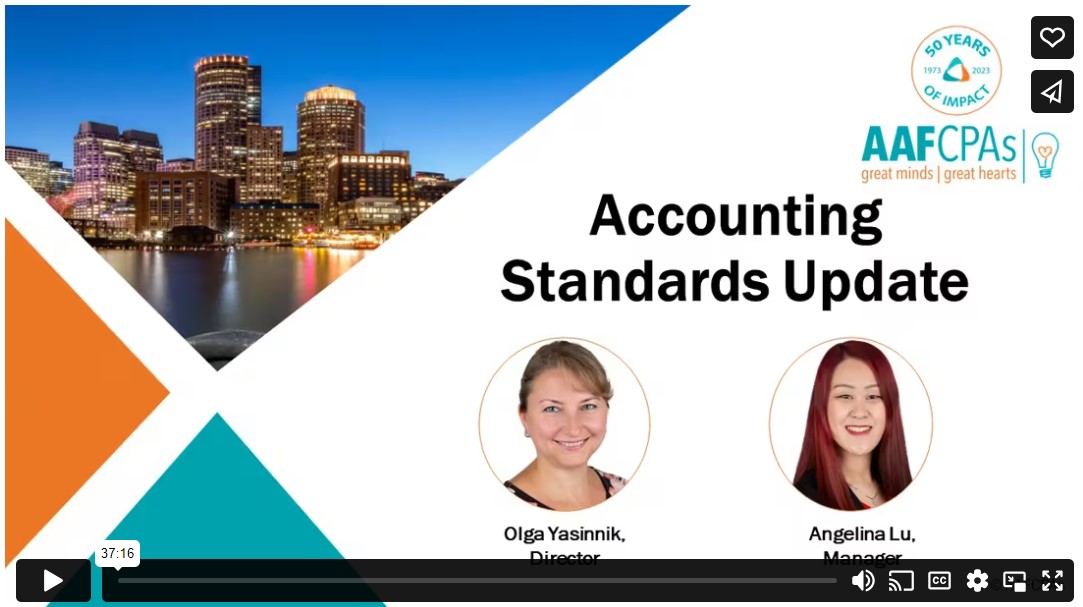Accounting Standards Update: Leases, CECL
During AAFCPAs’ recent Nonprofit Seminar (April 2023), assurance leaders Olga Yasinnik, CPA, MBA, and Angelina Lu, MSA, CPA updated more than 400 attendees on new accounting standards applicable to nonprofits.
The full session was recorded and may be viewed as a webcast at your convenience. >>
The Lease Standard
Olga and Angelina opened with an informative discussion on the Lease standard. Given its looming deadline, organizations are urged to prepare right away beginning with lease inventory. Once you’ve taken an inventory, begin to develop an implementation plan. Having an accurate policy in place is key to ASC 842 implementation. Financial statement users need to be informed of the significance of this change. Clients are also reminded to update accounting policies and procedures including materiality determination and internal controls. Keep in mind that standards are complex with a great deal of nuances, and this is the first year organizations will be audited for adoption. The nearer you are to year end, the more pressing the process. So those who have yet to begin may not have enough time or resources at their disposal. AAFCPAs’ Lease Task Force is in place to assist in this process and to alleviate some of that stress.
Lease modifications were also covered. These include any changes to the terms and conditions of the contract that results in a change of scope for lease consideration. Lease modifications might include a change to the space or terms of the lease, such as extensions or early terminations. Also, embedded leases were discussed. Embedded leases are those hiding in a service contract in which something is being leased that falls under ASC 842. It’s important to understand which types of contracts you should look out for, such as equipment leases within outsourced contracts along with those in IT and cable/internet, vending machine, shredding box, plant, art, or billboard contracts.
If you have yet to adopt the new standard, AAFCPAs can help with lease classifications and calculations, determination of the discount rate and lease term, review of lease agreements, summary preparation, and documentation of accounting treatments. AAFCPAs can also offer guidance when reviewing and updating accounting policies and procedures or with business process optimization, software selection, and spreadsheet setup including recurring entries.
Refer to AAFCPAs’ website for helpful, downloadable resources including:
- Lease Accounting Implementation Checklist
- AAFCPAs’ Guide to Lease ASU Implementation webinar
- Guidance on New Lease Accounting Standard white paper
Current Expected Credit Loss Impairment (CECL) Model
While the Current Expected Credit Loss Impairment, or CECL, Model under ASC 326 has been effective for public companies since 2020, this model only recently took effect for nonprofits for the calendar year 2023 and fiscal year 2024 year-ends.
This new standard will have a sizable impact on the lending industry but also affects trade receivables and contract assets recognized under Topic 606. Some exclusions from the CECL model include contributions (pledges) receivable and most grants receivable, if following the contribution model under Topic 958. Intercompany receivables between entities under common control are also excluded along with receivables that arise from operating leases, financial assets measured at fair value through net income, available-for-sale debt securities, loans made to participants by defined contribution benefit plans, and policy loan receivables for insurance entities.
Additionally, the CECL Model asks that we reflect the risk of loss. Even when that risk is remote, it changes the way risk loss is measured, and it requires that we consider both current conditions and future forecasts. This is something that cannot be assessed with a historical loss alone. You’ll want to apply this new standard on the first day of the fiscal year it is effective. When adopting the model, though, be mindful of key differentiators. For instance, you’ll need to consider lifetime credit losses, use a portfolio approach, and factor in current and future economic conditions.
Click here to watch the full presentation. 
If you have questions, please contact Olga Yasinnik, CPA, MBA at oyasinnik@nullaafcpa.com or 774.512.4082, Angelina Lu, MSA, CPA at alu@nullaafcpa.com or 774.512.4090—or your AAFCPAs partner.


